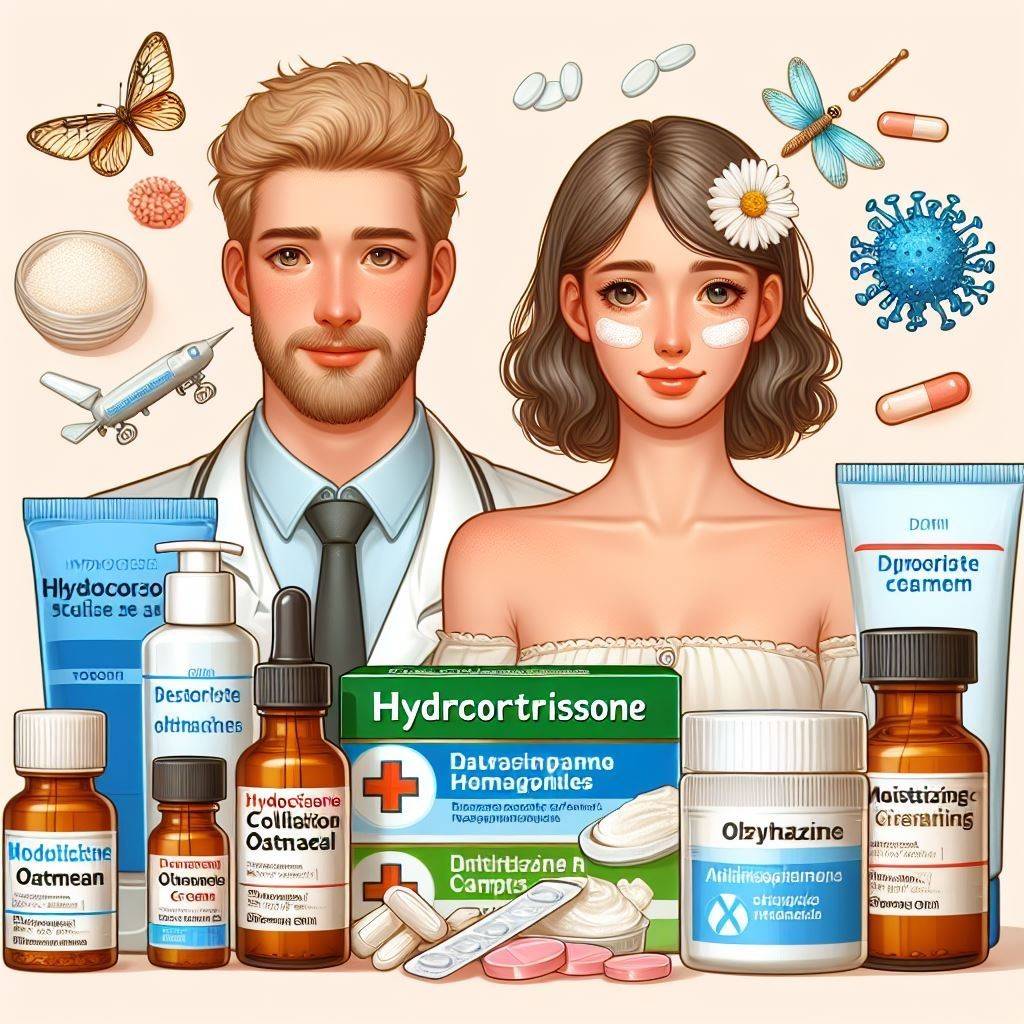Treatment of Skin Irritation: Easy Remedies for Sensitive Skin
Discover easy remedies for sensitive skin in our comprehensive guide to the treatment of skin irritation. Achieve soothing relief today!
Key Takeaways: Treatment of Skin Irritation
| Causes | Dryness, allergies, irritants |
| Prevention | Avoid triggers, moisturize |
| Home Remedies | Oatmeal, aloe vera, cold compresses |
| Over the Counter | Hydrocortisone, colloidal oatmeal |
| When to see a doctor | If symptoms persist or worsen, |
Skin inflammation may be frustrating and uncomfortable, causing redness, itching, and pain. Whether it’s because of dryness, allergies, or exposure to irritants, finding an effective treatment for skin infections is critical for sensitive skin. Treatment of Skin Irritation, In this article, we’ll explore easy treatments and tips to soothe and manage skin irritation, helping you achieve relief and healthy, radiant skin.
Understanding Skin Irritation
Skin irritation can manifest in various forms, such as rashes, itching, burning, or stinging sensations. It can be caused by a variety of factors, including:
- Dryness: Lack of proper moisture can lead to flakiness, itching, and cracking of the skin.
- Allergies: Certain substances, such as fragrances, dyes, or chemicals, can trigger an allergic reaction in sensitive skin.
- Irritants: Exposure to harsh soaps, detergents, or environmental pollutants can irritate the skin.
- Skin conditions: Underlying conditions like eczema, psoriasis, or contact dermatitis can make the skin more prone to irritation.
Identifying and avoiding potential triggers is the first step in managing skin irritation effectively.
Preventive Measures for Sensitive Skin
Before exploring the treatment of skin irritation, it’s essential to take preventive measures to minimize the likelihood of skin irritation occurring. Here are some tips:
- Avoid harsh products: Use gentle, fragrance-free, and hypoallergenic skincare products specifically formulated for sensitive skin.
- Moisturize regularly: Keep your skin hydrated by applying a gentle, fragrance-free moisturizer daily.
- Protect from environmental irritants: Limit exposure to harsh chemicals, extreme temperatures, and pollutants that can irritate the skin.
- Wear breathable fabrics: Choose soft, lightweight, breathable fabrics that won’t irritate or rub against the skin.
- Manage stress: Stress can exacerbate skin irritation, so find ways to relax and unwind, such as practicing meditation or engaging in gentle exercise.
By taking preventive measures, you can reduce the risk of skin irritation and keep your skin calm and healthy.
Home Remedies and Treatment of Skin Irritation

If you experience skin irritation, several effective home remedies can provide relief and promote healing:
-
Oatmeal Baths
Oatmeal has natural anti-inflammatory and soothing properties that can alleviate itching and irritation. To create an oatmeal bath:
- Grind plain, unflavored oats into a fine powder using a blender or coffee grinder.
- Add 1-2 cups of the oatmeal powder to warm bathwater and soak for 15-20 minutes.
- Gently pat your skin dry after the bath and apply a fragrance-free moisturizer.
-
Aloe Vera
Aloe vera is renowned for its cooling and moisturizing effects, making it an excellent choice for soothing irritated skin. Apply fresh aloe vera gel directly to the affected areas or look for skincare products containing aloe as an ingredient.
-
Cold Compresses
Applying a cold compress can help reduce inflammation, itching, and discomfort associated with skin irritation. Soak a clean cloth in cool water, wring out excess water, and gently press it against the affected areas for 10-15 minutes.
-
Baking Soda Paste
Baking soda has natural anti-inflammatory and soothing properties that can help calm irritated skin. Mix a tablespoon of baking soda with enough water to form a paste, and gently apply it to the affected areas. Leave it on for 10-15 minutes before rinsing with cool water.
-
Honey
Honey is a natural humectant and has antibacterial and anti-inflammatory properties that can help soothe and heal irritated skin. Apply a thin layer of raw, unprocessed honey to the affected areas and leave it on for 15-20 minutes before rinsing.
Remember, while these home remedies can provide relief, it’s essential to monitor your skin’s reaction and discontinue use if any adverse effects occur.
Over-the-counter treatments of Skin Irritation

Besides home remedies, several over-the-counter (OTC) treatments can help alleviate skin irritation:
-
Hydrocortisone Creams
Hydrocortisone creams are topical corticosteroids that can reduce inflammation, itching, and redness associated with skin irritation. Look for low-strength (0.5% or 1%) hydrocortisone creams and follow the instructions carefully.
-
Colloidal Oatmeal Products
Colloidal oatmeal is finely ground oatmeal that can be found in various skincare products, such as creams, lotions, and ointments. These products can help soothe and moisturize irritated skin.
-
Antihistamines
If your skin irritation is caused by an allergic reaction, antihistamines like cetirizine or loratadine can help reduce itching and inflammation.
-
Moisturizing Creams and Ointments
Keeping the skin well-hydrated is essential for managing skin irritation. Look for fragrance-free, hypoallergenic moisturizers containing ingredients like ceramide, glycerin, or hyaluronic acid to help restore and maintain the skin’s moisture barrier.
Always read the labels carefully and follow the instructions when using OTC treatments. If your symptoms persist or worsen, it’s best to consult a dermatologist for professional advice and treatment.
When to Seek Medical Attention
While many cases of skin irritation can be managed with home remedies and OTC treatments, there are instances when seeking medical attention is necessary:
- If the irritation is severe, widespread, or accompanied by other symptoms like fever or swelling.
- If the irritation persists for more than a few days despite home treatment.
- If you suspect the irritation is caused by an underlying skin condition like eczema or psoriasis.
- If the irritation is causing significant discomfort or interfering with daily activities.
A dermatologist can accurately diagnose the cause of your skin irritation and provide appropriate medical treatment, such as prescription-strength topical or oral medications, to help alleviate your symptoms effectively.
FAQs: Treatment of Skin Irritation
What is the best medicine for skin irritation?
Over-the-counter hydrocortisone creams and colloidal oatmeal products can provide relief for mild-to-moderate skin irritation. However, if the irritation is severe or persistent, a dermatologist may prescribe stronger topical or oral medications, such as corticosteroids or immunomodulators.
How do you treat irritated skin?
To treat irritated skin, try home remedies like oatmeal baths, aloe vera, cold compresses, baking soda pastes, or honey. Over-the-counter treatments like hydrocortisone creams, colloidal oatmeal products, and antihistamines can also help alleviate symptoms. Keeping the skin moisturized and avoiding potential irritants are also important steps in managing skin irritation.
What is the best ointment for irritated skin?
Some of the best over-the-counter ointments for irritated skin include hydrocortisone creams, colloidal oatmeal ointments, and fragrance-free, hypoallergenic moisturizing ointments containing ingredients like ceramide, glycerin, or hyaluronic acid. These can help reduce inflammation, soothe itching, and restore the skin’s moisture barrier.
What is the first aid treatment for skin irritation?
For minor skin irritation, the first aid treatment includes:
- Avoiding further exposure to the irritant
- Gently cleanse the affected area with cool water and a mild, fragrance-free cleanser
- Apply a cold compress to reduce inflammation and itching.
- Use an over-the-counter hydrocortisone cream or ointment to soothe the skin.
- Keeping the area moisturized with a fragrance-free, hypoallergenic moisturizer.
If the irritation is severe or covers a large area of the body, it’s best to seek medical attention.
Conclusion
Treatment of skin irritation is essential for maintaining healthy, comfortable, and radiant skin. By understanding the causes of skin irritation, taking preventive measures, and exploring effective home remedies and over-the-counter treatments, you can find relief and promote healing. Remember, if your symptoms persist or worsen, it’s crucial to seek medical attention from a dermatologist for proper diagnosis and treatment.

Adel Galal is a health and wellness writer with over 30 years of experience studying and writing about health, fitness, nutrition, and healthy living. He is the founder of NextFitLife.com, where he shares practical, evidence-based guidance to support long-term health at any age. Adel’s mission is simple:
to help people make smarter health choices that fit real life, at any age.



